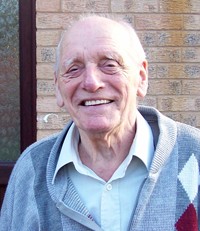|
German prisoners of
war
German prisoners captured in Europe
during the Second World War of 1939-45 were shipped to camps throughout
Britain and few areas in eastern England escaped their presence,
particularly Lincolnshire. They were gainfully employed on various duties,
mainly farming, and many met and married local girls and remained here at
the war’s end rather than be repatriated.
Hanthorpe House, a late 18th century mansion near Bourne, was
requisitioned by the War Office to accommodate them and with temporary
huts built in the grounds, eventually housed over 100 prisoners. Among
them was Hans-Gunter Pruhs, an 18-year-old from Hamburg who had been in the army
for less than a year.
Hans was born at Hamburg on 15th
August 1926 and after attending school, worked as as a mechanic before
being called up for service with the German army on 7th January 1944. He
became a private with an anti aircraft unit which was posted to Holland,
surviving the Battle of Arnhem in September that year only to be captured
by the advancing American troops at Eindhoven and was imprisoned after
being injured by snipers with nine of his comrades while manning an
AA battery but were overcome by enemy numbers. “We were trying to halt the
American advance”, he said, “but there were just too many of them. Seven
of our men were killed by snipers and the other two, including myself,
wounded. I was lucky because I was only shot through the arm and I did not
even realise that I had been hit until I saw the blood.
“We were taken to a military hospital in Eindhoven and that night there
was a German aid raid and so we were all taken down into the cellars and
it was here that I met an English soldier for the first time. My comrade
who had also been wounded by the snipers died from his injuries that night
in the cellar and so I was the only survivor from my battery. In some
respects, my injury came as a relief because for me, the war was over. But
these were just my deep and innermost feelings and I cannot describe
exactly how I felt. It was impossible to put it into words.”
Hans spent the next two weeks in a POW camp in Holland before being
transported to England by truck, ship and then train to London, surviving
yet another German air raid, this time one of unmanned V2 rockets, known
as flying bombs or doodlebugs, and after a spell of documentation and
delousing, he was sent to a camp in South Wales and eventually to
Hanthorpe.
|
Hanthorpe House was built in 1790 and
occupied for much of its history by the Parker family. During the
Second World War, it was converted into accommodation for German
prisoners of war and more than 100 were based here at any one time.
Here is a group of prisoners pictured relaxing in the imposing
doorway in 1947 but the house has since been demolished. |
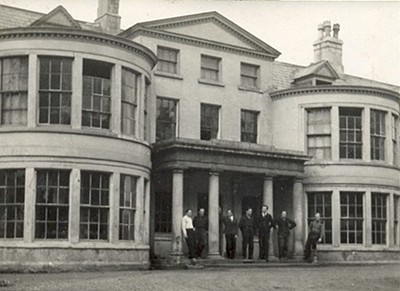 |
The prisoners were soon provided with employment, working mainly for local
farmers in the fields on a variety of tasks such as harvesting, but
because of the mass of paper work and other arrangements required, there
was no immediate repatriation when the war ended and it was to be several
years before Hans was finally freed. By this time he was working for
Wherry and Sons Limited, the Bourne firm of seed merchants, and on 15th
January 1949 he was taken by a member of the staff to Spalding to be
discharged and was given the chance of staying on in England or returning
to Germany. “I chose to stay”, he said.
Hans had good reason to remain in this country, having met his future
wife, Pearl Rodgers, who was working at the Woodland Nurseries, a
greenhouse complex owned by the Moody family in what is now Exeter Street,
and they were married later that year and went to live in Ancaster Road
where they had four children, David, Lyn, Kevin and Mandy. He returned to
Germany for the first time in the summer of 1954 with Pearl and three of
his children for an emotional reunion in Hamburg with his parents,
Frederick and Louise Pruhs. But the marriage did not last and they were
divorced in 1965 although they remain firm friends and meet often.
|
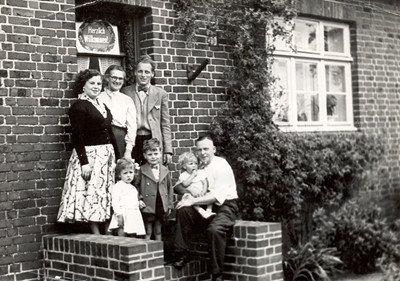 |
Hans went home to Germany in 1954 for the first
time since he had left home to go to war with his wife Pearl and
three young children for a reunion with his parents, Frederick and
Louise Pruhs and they are pictured here at their home in Hamburg
with a welcome sign over the door. Frederick Pruhs is seated holding
toddler Kevin and his wife is standing in the doorway (centre). |
During his years in Bourne, Hans was a keen footballer, playing for the
village teams at Twenty, Swinstead and Edenham during the 1950s. “There
was some animosity towards those who had been prisoners of war”, he said,
“but it came to nothing and eventually petered out. I never took a lot of
notice, anyway. If people wanted to call me names then I let them get on
with it. That was always my motto. At that time, the war was still fresh
in the minds of the people but after a time they came to realise that we
are all the same and just wanted a happy life. Now, it is never even
mentioned or thought about.”
Hans moved to Peterborough then to Doddington in Cambridgeshire and
eventually to Spain with his new partner, Rose Cole, but she died in 2005
and the following year he decided to return to Bourne, the town that holds
so many memories, and lives comfortably at a small house in Baldwin Grove
and his ex-wife Pearl lives just around the corner.
Now at the age of 80 he reflects on his life. “This is really the ideal
place to be”, he said. “I am getting older and I can easily walk from here
to the shops but I do feel happy and secure. I have been asked whether I
made the right decision by staying in England all those years ago but who
can say? We take decisions as and when they are required and we do so on
what our circumstances are at the time. Germany in 1949 was in a poor
state, still suffering from the aftermath of war, with shortages in every
part of life, and so the prospect of remaining in England that I had got
to know seemed better at the time. Whether this was the right decision for
me and I might have done better in going home, I will never know but it is
one I have never regretted.”
|
PRISONERS OF THE
GREAT WAR AT RIPPINGALE
During the Great War of 1914-18, 56 German
prisoners were sent to Rippingale, 28 living in the clubroom at the
Bull Inn and the same number at Camp Farm in the nearby fen and all
were employed on vital agricultural work. The war was practically
over and so they were billeted in the village rather than imprisoned
and were soon accepted by the local inhabitants, even taking part in
village life by giving concerts. At Christmas 1918, villagers threw
a party for them and presented each one with a silver sixpence with
which they made trinkets such as brooches and rings that were hung
on a Christmas tree. The photograph below shows some of the German
prisoners at Rippingale Fen on 19th April 1919 shortly before they
returned home together with a picture of their concert party which
provided so much enjoyment for the village. |
|
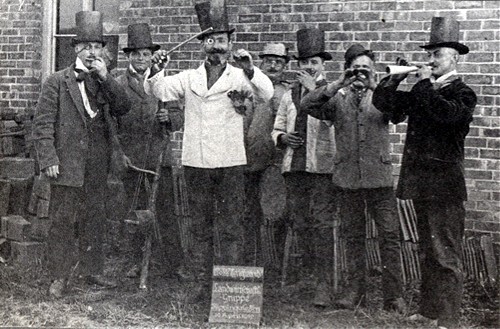 |
|
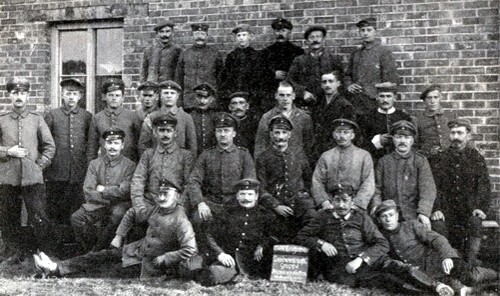 |
|
THE SECOND WORLD WAR OF 1939-45
A severe cold spell in early 2010 brought back
memories of past winters during the Second World War of 1939-45 when
German prisoners of war were again stationed in the locality. Jim
Stubley of East Street, Rippingale, wrote two letters to the
Stamford Mercury (January 15th & 29th) remembering that many
were still here during the severe winter of 1947 and were called out
to help clear drifting snow from the roads, particularly along
Doctor's Lane in order that Dr Geoffrey Morris could get out to
visit his patients. They also helped pull and top sugar beet, the
arduous method of harvesting by hand before mechanisation, and pick
potatoes, a similarly back-breaking task, and by this time they had
all become well known and had even integrated in village life, an
echo of similar circumstances thirty years before.
"In 1946, the Germans pulled and topped Mr Jessop's sugar beet at
Rippingale", wrote Jim. "We managed to get all the beet carted off
the fields before the snow started to fall. My job was to take a
horse with an empty cart to the two men in the field to fill it with
beet and then take it back full to be emptied at the roadside. I was
only 14 at the time and two of the horses had only just been broke
in by Mr East of Bourne.
"One of the Germans who also helped pick my Dad's potatoes in 1945
was nicknamed Sailor. He could speak good English and was a nice
friendly man. He told me that he had joined the navy to see the
world and did not want to fight." |
NOTE: Hans-Gunter Pruhs died on Thursday 23rd August 2012,
aged 86, and
was cremated at Peterborough on September 7th..
REVISED AUGUST 2012
See also Hanthorpe
House

Go to:
Main Index Villages
Index
|
